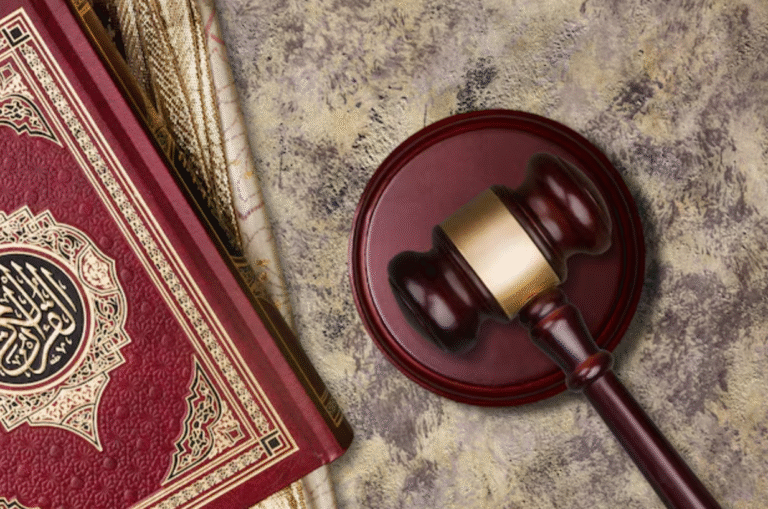Shariah, often known as Islamic law, a key part of Islam. It provides directions on how to lead, fair and balanced life in addition to punishments and rules. The teachings of Quran and Prophet (PBUH) are the sources of Shariah. It promotes social responsibility, ethics and justice while giving Muslims a way to live accordance with their faith.
What is Shariah?
In Arabic, Shariah means a clear path. For Muslims, it serves as a kind of road map that directs them in their community affairs, business dealings, family life and religion. Shariah dictates social relationships, individual behaviour and even government. Shariah serve as a guide to help individuals to live accordance with Allah’s commands and treat other with love and justice.
Sources of Shariah
The pillars upon which Islamic law is built are the sources of Shariah. They offer guidance to Muslims on social fairness, prayer and daily life. The primary sources are as follow with clear explanations:
1. The Quran
- The main source of Shariah.
- It is the message of Allah as revealed to Prophet (PBUH).
- It offers guidelines on social issues, justice, ethics, worship, marriage and family.
2. Sunnah
- The Prophet’s actions, saying and approval are all included in Sunnah.
- It expands and clarifies on the Quran.
- For example, Muslims are commanded to pray by the Quran and Sunnah describes the proper way to do so.
3. Ijma
- An agreement of a group of qualified and experienced on a legal or practice issue is recognized as a source of Shariah. This make decision stronger and more trustworthy by ensuring that they depend on the collective wisdom rather than opinion of single person.
- When something is not specifically mentioned in the Quran or Sunnah, Ijma is helpful in that situation.
4. Qiyas (Analogical Reasoning)
- Comparing a new topic to anything that has already been covered in the Quran and Sunnah is known as Qiyas.
- For example, Wine is not allowed in the Quran due to its intoxicating properties. In the same way, drugs are also forbidden because of the same dangerous and harmful effect.
5. Secondary Sources (used when needed)
- Istihsan: There could be more than one legal verdict on a given matter. The one that makes people’s lives easier, fairer and more honest may be selected by scholars.
- Maslahah: As long as an action does not against the Quran and Sunnah, it may be made for the well-being and advantage of community.
- Urf: local traditions and customs can be accepted if they do not go against Islam.
Shariah as a Legal System
Shariah is more than just a collection of rule. It is a comprehensive legal system that addresses people’s worldly needs and spiritual requirements. Shariah also promotes moral responsibility and the intentions behind actions, in contrast to many modern legal systems that place a greater emphasis on laws and punishments. For example, Shariah contains laws controlling charity, trade, marriage and inheritance. It encourages qualities like kindness, justice and honesty at the same time. It is both a legal system and moral framework because of this balancing.
Shariah and Ethics
The emphasis on ethics in Shariah is one of its best features. Ethics in Shariah refers to doing the right things and staying away from doing wrong things. Muslims are urged by it to be honest, fulfil commitment and stop hurting other people. Muslims must spend their life according to the ethics of Prophet Muhammad PBUH.
For example:
- Lying and cheating are forbidden.
- It is strongly advised to respect parents and help the poor people.
- All business dealings must be equitable, fair and free from fraud and exploitation.
Shariah contributes to the development of culture which promotes kindness, fairness and trust by promoting these ethical principles.
Social Justice in Shariah
The core of Shariah is justice. Fairness in required by the Quran in all situations, whether interacting with strangers, neighbours, family and friends. Shariah emphasizes that everyone should be treated equally and no one is above the law.
The following are some examples of social justice in Shariah:
- Zakat: A certain percentage of wealth must be donated to the poor people. This helps needy and diminishes inequality.
- Fair treatment of women and orphans: Islam protect women’s rights in education, inheritance and marriage. Orphans deserve kind and respectful treatment.
- Worker’s rights: Companies must pay employees on time and fairly.
Misunderstandings about Shariah
Shariah is misunderstanding by many because they only associate it with only severe penalties. Punishments actually made up a tiny portion of Shariah. The majority of Shariah is concerned with ethics, family, business and worship.
Shariah is out of the date is another myth. However, its values of equality, fairness and morality never go out of style. They can be used in contemporary society to push for harmony and justice.
Shariah in Daily Life
Shariah is not just for governments or courts. It also helpful in daily life activities. When Muslims fast, pray, donate charities or be generous to others, they are adhering to Shariah. Living under Shariah includes preventing harmful behaviours, choosing Halal and Haram foods and keeping your words. This highlights that Shariah is both social system and an individual’s religious journey.
Shariah and Modern Society
Shariah is currently applied in different way in numerous Muslim countries. While some combines it with modern laws, others employ it entirely in their legal systems. However, Muslims reside in non-Muslims countries continue to conduct their lives in accordance with Shariah, including prayer, marriage and dietary habits. Shariah’s versatility make it acceptable in all eras and cultures. Even now, the concentration on morality, fairness and compassion makes it a useful and valuable system.
